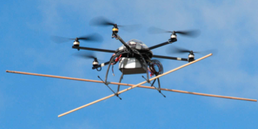Conference 22nd March 2013 10 a.m. Nuffield Theatre, Lecture Theatre A (6/1077)
Human-Agent Collectives: From Foundations to Applications
Prof Nick Jennings, FREng, FIEEE
University of Southampton
- Categories
- Agents, Complex Systems, Computer Science, Pervasive computing, Sensor Networks, Social Networks, Software Engineering, Visualisation
- Submitter
- Hans Fangohr

One “Hexacopter” unmanned air vehicle (UAV) gathering data in a disaster response activity. Source: http://www.orchid.ac.uk/eprints/48/
This vision of people and computational agents operating at a global scale offers tremendous potential and, if realised correctly, will help us meet the key societal challenges of sustainability, inclusion, and safety that are core to our future. To fully realise this vision, we require a principled science that allows us to reason about the computational and human aspects of these systems. Delivering this science is the core research objective of ORCHID. Specifically, we seek to establish the science that is needed to understand, build and apply Human-Agent Collectives that symbiotically interleave human and computer systems to an unprecedented degree. With multi-disciplinary expertise in the areas of artificial intelligence, agent-based computing, machine learning, decentralised information systems, crowd sourcing, participatory systems, and ubiquitous computing, the ORCHID team aims to drive the science of Human-Agent Collectives to real-world applications in the critical domains of the smart grid, disaster response and citizen science.
This invited talk is part of the Computational Modelling Group's Annual Meeting 2013
About Prof Jennings
Professor Jennings divides his time between his posts as a Chief Scientific Advisor to the UK Government and Professor of Computer Science in the School of Electronics and Computer Science at Southampton University, where he heads the Agents, Interaction and Complexity Group (he previously headed the Intelligence, Agents, Multimedia Group). Nick is an internationally-recognised authority in the areas of agent-based computing and intelligent systems. His research covers both the science and the engineering of such systems. Specifically, he has undertaken fundamental research on automated bargaining, auctions, mechanism design, trust and reputation, coalition formation and decentralised control. He has also pioneered the application of multi-agent technology; developing some of the first real-world systems (in domains such as business process management, energy systems/smart grid, sensor networks, disaster response, telecommunications, and eDefence) and generally advocating the area of agent-oriented software engineering.